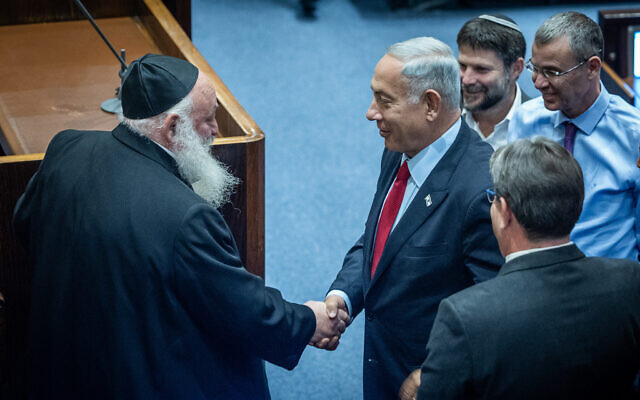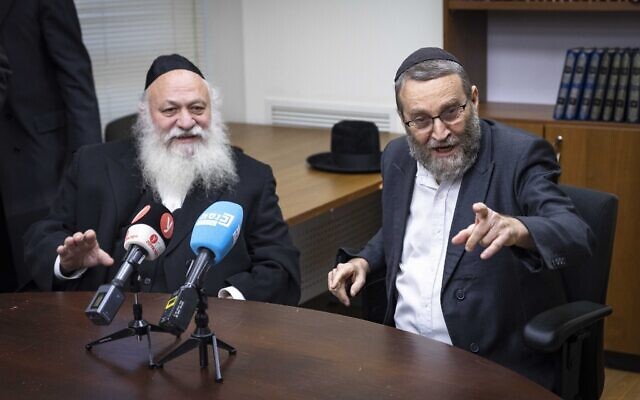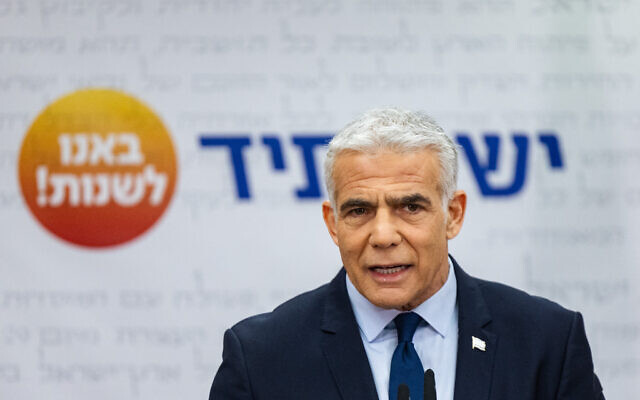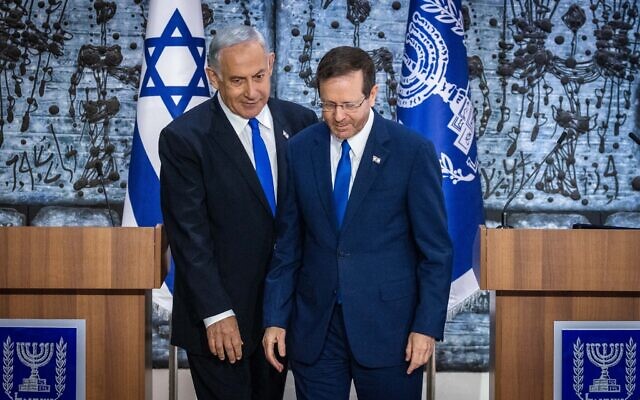Haredi faction said to win backing for barring energy creation on Shabbat, expanding gender-segregated beaches and much more, but Netanyahu’s party denies agreeing to demands

Amid coalition talks between the ultra-Orthodox United Torah Judaism and Likud parties, a report Monday night appeared to expose a series of far-reaching and potentially costly reforms at the heart of the negotiations that would dramatically expand the state’s entanglement with Orthodox Judaism across wide swaths of life for all Israelis.
Despite denials that the measures had been agreed upon, the report, carried by Channel 12 news, was seized upon by the outgoing government, who issued angry denunciations and vowed to fight the reported reform proposals.
The unsourced and unverified Channel 12 bombshell posited that Likud had agreed to a range of UTJ demands, including regulations requiring power plants to shut down from sundown Friday to sundown Saturday, the establishment of state-funded bodies to answer questions on Jewish law, the expansion of gender-segregated beaches that cater to the religious, and the introduction of more religious studies in secular schools.
Both Likud and UTJ denied that a final agreement had been reached regarding the demands. Likud described the measures as “a list of demands from UTJ, not a deal that Likud has agreed to.”
Likud, led by Prime Minister-designate Benjamin Netanyahu, said that it would not agree to bar energy production on Shabbat or expand gender-segregated beaches.
In a statement, the party said that “any final agreement will preserve the status quo that has been observed for years on issues of religion and state.”
UTJ chief Yitzchak Goldknopf said in a statement late Monday that the two sides “are still currently sitting down for negotiations to formulate the coalition agreement.”
Goldknopf said a claim he made earlier Monday that “everything is finalized” did not refer to the publicized list of “demands attributed to the Haredi parties.”

Channel 12 laid out a series of clauses reportedly included in the Likud-UTJ coalition deal, which it described as only a partial list.
The reported reforms included:
- Passing a law to regulate the exemption of ultra-Orthodox youth from enlisting in the army
- Having a Chief Rabbinate representative on any panel weighing permits for work on Shabbat
- Barring electricity production on Shabbat
- Funding special archives known as a “genizah” — to preserve documents and papers containing God’s name, which according to Jewish law must not be thrown away
- Forming and funding bodies to provide answers to the public on questions of halacha, or Jewish law
- An agreement to increase the number of gender-segregated beaches
- Discounting public transportation in predominantly ultra-Orthodox cities
- Providing Haredim with affirmative action when applying for jobs in state-controlled bodies
- Allowing hospitals to ban hametz, or leavened wheat products, on Passover
- Allowing any citizen to demand in-ground burial, instead of above-ground structures known as vertical cemeteries established to battle overcrowding.
- Requiring more religious studies in the state’s secular school system
- Weighing the closure of the new Reform department in the Diaspora Affairs Ministry
- Mandating that all online government services also be provided via phone for those who shun internet use, as many ultra-Orthodox do
- Raising government payouts to yeshiva students
Members of the outgoing government quickly slammed news of such an agreement.
Outgoing Prime Minister Yair Lapid called the reported deal an “agreement of shameful surrender,” and said Netanyahu was moving Israel toward theocracy. Netanyahu, he said in a statement, is “leading us toward a halachic state. He’s selling our democracy for his personal interests…
“We won’t allow Israel to become a benighted country,” Lapid vowed.

Labor chief and outgoing Transportation Minister Merav Michaeli, who pushed for public buses in Tel Aviv on Shabbat, also decried the purported proposals
“Netanyahu is selling the State of Israel — it’s that simple,” she said. “We advanced public transport on Shabbat, they’re advancing halting energy production on Shabbat. And this is only the beginning.”
Outgoing Finance Minister Avigdor Liberman, head of the secularist Yisrael Beytenu party, vowed to “fight against these delusions and do everything in our power to stop them.”
Former Religious Services minister Matan Kahana said the reported agreement on allowing everyone to have a burial plot “would turn the center of the country into one giant cemetery.”
“If it wasn’t so insane, it would be laughable,” said Kahana.
Kahana noted that there are currently 2.5 million graves in Israel, “and in another 83 years there will be 9 million more. Whoever thinks we can continue in-ground burials is delusional.”
National Unity MK Sharren Haskel also accused Netanyahu of folding to ultra-Orthodox demands in exchange for coalition loyalty, selling out the state.
“They are cashing the check that Netanyahu promised them in order that they would not sit [in a coalition] with anyone but him, and the Israeli public will be paying for it with interest,” Haskel tweeted.
Such a government is one that “will cause religion to become hated by the Israeli public,” she added.

Netanyahu is currently racing the clock to form his likely 64-seat coalition with partners UTJ, Shas, Religious Zionism, Otzma Yehudit and Noam. President Isaac Herzog granted him a 10-day extension on Friday.
Last week, UTJ and Likud signed an interim deal agreeing to the allocation of roles in the next government, but holding off on deciding on “fundamental issues,” the party said at the time.
In the agreement with UTJ, the party is slated to receive control of the Construction and Housing Ministry, expected to go to faction chief Goldknopf, and the chairmanship of the Knesset Finance Committee, slated to be held by MK Moshe Gafni.
The party will also control the Jerusalem Affairs and Heritage Ministry, receive several deputy minister positions, and control a handful of other Knesset committees.
Previous reports described UTJ demands for a law giving the Knesset the ability to legislate rules struck down by the court, favorable military draft deferments for yeshiva students, and increased funding for religious schools regardless of curriculum.
As reported by The Times of Israel
